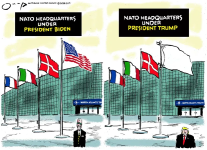signalmankenneth
Verified User
If Trump somehow is able to get out of NATO with the blessings of congress too, it will be America alone on the world stage, with no allies?!!
Here is the problem: if the U.S. leaves NATO, then the U.S. won't likely maintain a presence in Europe, Africa, or the Middle East. The gut reaction might be "good," but it isn't good. Many countries might even move closer to Russia or China.
American Alone Won't Be a Superpower – We Might Not Even Survive - There is no denying that the United States remains the world's mightiest superpower – one with a sizable economy, massive military, and, most notably, a nuclear arsenal that can ensure the destruction of the world if push came to shove. Yet, even as a superpower, the United States can't stand alone.
This should be remembered as former President Donald Trump warned in a campaign speech in South Carolina on Saturday that some U.S. allies weren't paying enough when it came to their national defense obligations. He told how he said as president to an unnamed ally, "You didn't pay? You're delinquent? No, I would not protect you. In fact, I would encourage them to do whatever the hell they want. You gotta pay. You gotta pay your bills.'"
That statement was met by cheers from attendees.
Yet, NATO Secretary-General Jens Stoltenberg responded with an unusually strong statement saying that Trump was threatening the security of the entire trans-Atlantic alliance.
"Any suggestion that allies will not defend each other undermines all of our security, including that of the U.S., and puts American and European soldiers at increased risk," Stoltenberg said.
Many Americans may believe that NATO isn't needed any longer and that Europe should handle its own affairs. But perhaps those cheering should re-watch the 1984 film Red Dawn or even the 2012 remake. Neither film is particularly good, but the original opens with an ominous warning that NATO has broken up and the United States has entered a period of isolationism. Then, the Soviet paratroopers start landing on a rural high school.
It is far-fetched, to say the least, but the thought that America could stand alone should still send chills down the spine.
If we're not there for Europe, then Europe won't be there for the United States.
"So what," will respond the Trump supporters, who will almost certainly add, "America doesn't need them!"
If our allies and partners can't count on us to be there, we will lose access to many military bases around the globe. That might not seem like a big deal since we have a fleet of warships and aircraft that can fly from the continental U.S. to the Middle East and back.
But here is the thing. Our nuclear-powered supercarriers may have unlimited endurance, but the vessels supporting them do not. They need those bases around the world. Without friendly ports, the United States Navy doesn't look so much like a blue water force but rather a green water navy that can only operate closer to America's shores.
Yes, the B-1, B-2, and B-52 can fly around the globe thanks to modern aerial refueling, but the tankers can only support them so far. Without the bases in Europe, Asia, and the Middle East our ability to fly around the world will become that much harder.
This, again, may not seem like a big deal. The United States can defend itself, right?
The oceans will protect us, like they did in both World Wars. We produce oil, and grow our own food. America can survive without the rest of the world. Except we could lose access to the global markets, and the U.S. could face sanctions from the new superpowers of China and Russia.
If that wasn't enough of a concern, just last week, reports circulated that Chinese hackers have been active in U.S. computer networks for half a decade or longer. Beijing could launch a massive cyber attack on the U.S., crippling our economy and leaving us literally in the dark.
Now imagine if a coalition of China, Russia, North Korea, and Iran – joined by their proxies and other nations that view the top dog as weak – decided to launch a combined attack.
Apart from a nuclear response, what could we do?
The bigger danger is that we may not be able to count on our nukes. A cyber attack could take our land-based missiles offline, some experts have warned. Our bombers couldn't reach targets halfway around the world without support from allies. Our F-35s may be the best in the world but how would they reach any targets as well? That leaves our aging submarine fleet, and it might not be enough to respond to all of our adversaries if we stand alone.
In addition to the options from Germany, France, the UK, and Israel, other nations including Poland, Japan, and South Korea are all ramping up their respective arms industries. The days of the United States as the top supplier of arms could come to an end if we really seek to go it alone.
This isn't just about profits for Lockheed Martin, Northrop Grumman, Boeing, and General Dynamics. It is about the hundreds of thousands of jobs at those companies and their subcontractors. The United States may spend more on its military than any other country, but it isn't enough to keep all those firms afloat. Foreign sales are crucial for those firms.
These are all points to consider when any politician complains that our allies "gotta pay." What do they "gotta" pay that will make any difference to the United States? Yes, our allies should carry their weight, and increasingly many are. But we need to remember if every NATO ally suddenly increased their defense spending, it doesn't mean we're going to pay any less.
If we go it alone, America will be the one that pays more than money.
https://nationalinterest.org/blog/buzz/what-happens-if-donald-trump-pulls-america-out-nato-209378


Here is the problem: if the U.S. leaves NATO, then the U.S. won't likely maintain a presence in Europe, Africa, or the Middle East. The gut reaction might be "good," but it isn't good. Many countries might even move closer to Russia or China.
American Alone Won't Be a Superpower – We Might Not Even Survive - There is no denying that the United States remains the world's mightiest superpower – one with a sizable economy, massive military, and, most notably, a nuclear arsenal that can ensure the destruction of the world if push came to shove. Yet, even as a superpower, the United States can't stand alone.
This should be remembered as former President Donald Trump warned in a campaign speech in South Carolina on Saturday that some U.S. allies weren't paying enough when it came to their national defense obligations. He told how he said as president to an unnamed ally, "You didn't pay? You're delinquent? No, I would not protect you. In fact, I would encourage them to do whatever the hell they want. You gotta pay. You gotta pay your bills.'"
That statement was met by cheers from attendees.
Yet, NATO Secretary-General Jens Stoltenberg responded with an unusually strong statement saying that Trump was threatening the security of the entire trans-Atlantic alliance.
"Any suggestion that allies will not defend each other undermines all of our security, including that of the U.S., and puts American and European soldiers at increased risk," Stoltenberg said.
Many Americans may believe that NATO isn't needed any longer and that Europe should handle its own affairs. But perhaps those cheering should re-watch the 1984 film Red Dawn or even the 2012 remake. Neither film is particularly good, but the original opens with an ominous warning that NATO has broken up and the United States has entered a period of isolationism. Then, the Soviet paratroopers start landing on a rural high school.
It is far-fetched, to say the least, but the thought that America could stand alone should still send chills down the spine.
If we're not there for Europe, then Europe won't be there for the United States.
"So what," will respond the Trump supporters, who will almost certainly add, "America doesn't need them!"
Does America Need NATO?
Here is the problem: if the U.S. leaves NATO, then the U.S. won't likely maintain a presence in Europe, Africa, or the Middle East. The gut reaction might be "good," but it isn't good. Many countries might even move closer to Russia or China.If our allies and partners can't count on us to be there, we will lose access to many military bases around the globe. That might not seem like a big deal since we have a fleet of warships and aircraft that can fly from the continental U.S. to the Middle East and back.
But here is the thing. Our nuclear-powered supercarriers may have unlimited endurance, but the vessels supporting them do not. They need those bases around the world. Without friendly ports, the United States Navy doesn't look so much like a blue water force but rather a green water navy that can only operate closer to America's shores.
Yes, the B-1, B-2, and B-52 can fly around the globe thanks to modern aerial refueling, but the tankers can only support them so far. Without the bases in Europe, Asia, and the Middle East our ability to fly around the world will become that much harder.
This, again, may not seem like a big deal. The United States can defend itself, right?
The oceans will protect us, like they did in both World Wars. We produce oil, and grow our own food. America can survive without the rest of the world. Except we could lose access to the global markets, and the U.S. could face sanctions from the new superpowers of China and Russia.
We Can't Defend Ourselves
The United States has a powerful military – but anyone who is paying attention knows we're having problems meeting recruitment quotas, the U.S. Navy is the smallest it has been since the First World War, and the U.S. Air Force has the fewest planes since any time before World War II.If that wasn't enough of a concern, just last week, reports circulated that Chinese hackers have been active in U.S. computer networks for half a decade or longer. Beijing could launch a massive cyber attack on the U.S., crippling our economy and leaving us literally in the dark.
Now imagine if a coalition of China, Russia, North Korea, and Iran – joined by their proxies and other nations that view the top dog as weak – decided to launch a combined attack.
Apart from a nuclear response, what could we do?
The bigger danger is that we may not be able to count on our nukes. A cyber attack could take our land-based missiles offline, some experts have warned. Our bombers couldn't reach targets halfway around the world without support from allies. Our F-35s may be the best in the world but how would they reach any targets as well? That leaves our aging submarine fleet, and it might not be enough to respond to all of our adversaries if we stand alone.
The Defense Industry Will Suffer
If the United States pulls out of NATO, it is also equally likely that the buyers for American arms will dry up. Europe is already developing a sixth-generation fighter aircraft, so we can expect any F-35 orders to be canceled. The same goes for many of the land-based systems.In addition to the options from Germany, France, the UK, and Israel, other nations including Poland, Japan, and South Korea are all ramping up their respective arms industries. The days of the United States as the top supplier of arms could come to an end if we really seek to go it alone.
This isn't just about profits for Lockheed Martin, Northrop Grumman, Boeing, and General Dynamics. It is about the hundreds of thousands of jobs at those companies and their subcontractors. The United States may spend more on its military than any other country, but it isn't enough to keep all those firms afloat. Foreign sales are crucial for those firms.
These are all points to consider when any politician complains that our allies "gotta pay." What do they "gotta" pay that will make any difference to the United States? Yes, our allies should carry their weight, and increasingly many are. But we need to remember if every NATO ally suddenly increased their defense spending, it doesn't mean we're going to pay any less.
If we go it alone, America will be the one that pays more than money.
https://nationalinterest.org/blog/buzz/what-happens-if-donald-trump-pulls-america-out-nato-209378







